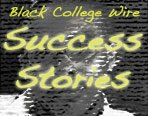| HBCUs Attempt to Aid Haitian Students |  |
 |
 |
| By Antonio Hairston -- Black College Wire | |
FAMU Raises Funds for Haitian Student in NeedBy Antonio Hairston During a Haiti relief program in Lee Hall, a Florida A&M staff member asked the crowd to raise their hands if they have not been able to contact their families. A majority of people did. More than 150 students said they have not been able to contact relatives in Haiti. Just four days after a 7.0 magnitude earthquake hit the island of Haiti, FAMU and campuses across the nation started collecting relief funds. 
Gregory Souvenir/The Famuan
Rodeline Felix of the Haitian Cultural Club
Last week, President James Ammons formed the Haiti Relief Planning Committee to ensure money raised on campus will go to Haiti and those students in need. Relief efforts have started. FAMU volunteers took donations at the door during the men and women’s basketball games Saturday. Students donated gallon water jugs, canned food and supplies for the cause to drop-off centers located around campus. An area for students to contact their family via phone or Internet will be available starting January 19 at the William Gray Call Center. Speakers included Provost Cynthia Hughes-Harris, Henry Kirby, associate vice president for student life and Saundra Inge, FAMU’s director of student activities. “These are very sad times for us as a university and as a people,” said Hughes-Harris. She encouraged students at the beginning of the meeting not to leave until ideas and innovative ways to help Haiti were brought to light. Hughes-Harris then thanked the different campus organizations like the Haiti Relief Fund, which was established by FAMU to fundraise and carry out the efforts in Haiti. “We must come together as a university and unite in times like these,” said Kirby at the relief address meeting. Kirby said that many of the outreach tools implemented to aid Haiti are reminiscent of what the university did after Hurricane Katrina devastated New Orleans in 2005. Inge said she would allow and support all campus organizations conducting events to raise money and help with relief efforts. “I ask that clubs and organizations combine and work together, put aside your differences and let’s help in as many ways as possible,” Inge said to the packed auditorium. Haitian students thanked their peers for their support and love. Sophomore business administration student Elouina Examtus said she was proud to hear how her university was lending a hand to her country. “Everybody’s voice was heard and I think that is one thing that is important so we can efficiently get help to the people of Haiti,” said the 19 year-old from Miami. For more information on how to donate or volunteer visit the Web site www.famu.edu/Haitirelief. The U.S. government hotline to find out about loved ones is 1-888-407-4747. Antonio Hairston writes for The Famuan, the Florida A&M University student newspaper, which originally published a version of this article. Student-led Effort Begins at North Carolina A&TBy Dexter R. Mullins & Malcolm S. Eustache Many North Carolina A&T students have family in Haiti. The university community has adopted a student-led initiative involving every organization on campus. Project Haiti, originally a program with the A&T Chapter of the National Association of Black Journalists, was picked up by the Student Government Association and the rest of the campus community. The goal of the project is to stuff the university athletic trailer used for transporting the band and sports teams equipment with supplies to help. Sophomore Keila Alfred was born in the United States, but lived the majority of her life in Haiti. Her parents were in Port-Au Prince when the earthquake struck. “I was raised in Haiti since I was a little kid,” Alfred said. “I’m 24, and I’ve been here (U.S.) since 2004. Haiti...that’s my life, that’s all I’ve ever known. I went to school there, all my friends are there.” Alfred said she first found out about the earthquake on Yahoo when she went to check her e-mail. She said she thought it was just something small. “It’s (earthquake trimmers) something that always happens, so I’m used to it.” “When I looked again, and I saw that the (Presidential) Palace had collapsed I said ‘oh my God,’ Alfred said. Alfred called her brother and sister, who both live in Miami, and they advised her to try and call home. At first she said she couldn’t get through but wasn’t as worried. “I called and called, on Wednesday, and on Thursday, the same thing,” Alfred said. “But when I called on Friday my father answered and said they were OK, so that was a relief.” Alfred said she and her family have lost everything -- their home, her high school, and her community have been leveled. “We’re trying to get them (her parents) here through the Dominican Republic because there are no flights out from Haiti,” Alfred said. “I think it will take years for Haiti to fully recover,” she added. “Even though everyone may be helping now, there is more than what $100 million can fix. All the big universities have collapsed, the hospitals have collapsed. It is going to take years.” Dexter R. Mullins & Malcolm S. Eustache write for The Register, The North Carolina A&T State University student newspaper, which originally published a version of this article.
|
|
| Posted Jan. 21, 2010 |
| < Prev | Next > |
|---|



